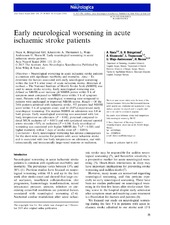Early neurological worsening in acute ischaemic stroke patients
Nacu, Aliona; Bringeland, Gerd Haga; Khanevski, Andrej; Thomassen, Lars; Waje-Andreassen, Ulrike; Næss, Halvor
Peer reviewed, Journal article
Published version

Åpne
Permanent lenke
https://hdl.handle.net/1956/12694Utgivelsesdato
2016-01Metadata
Vis full innførselSamlinger
Originalversjon
https://doi.org/10.1111/ane.12418Sammendrag
Objectives: Neurological worsening in acute ischaemic stroke patients is common with significant morbidity and mortality. Aims: To determine the factors associated with early neurological worsening within the first 9 h after onset of acute ischaemic stroke. Materials & methods: The National Institute of Health Stroke Scale (NIHSS) was used to assess stroke severity. Early neurological worsening was defined as NIHSS score increase ≥4 NIHSS points within 9 h of symptom onset compared to NIHSS score within 3 h of symptom onset. Patients with early neurological worsening were compared to patients with unchanged or improved NIHSS scores. Results: Of the 2484 patients admitted with ischaemic stroke, 552 patients had NIHSS score within 3 h of symptom onset, and 44 (8.0%) experienced early neurological worsening. The median NIHSS on admission was 8.4 in both groups. Early neurological worsening was associated with low body temperature on admission (P = 0.01), proximal compared to distal MCA occlusion (P = 0.007) and with ipsilateral internal carotid artery stenosis >50% or occlusion (P = 0.04). Early neurological worsening was associated with higher NIHSS day 7 (P < 0.001) and higher mortality within 7 days of stroke onset (P = 0.005). Conclusions: Early neurological worsening has serious consequences for the short-term outcome for patients with acute ischaemic stroke and is associated with low body temperature on admission, and with extracranially and intracranially large-vessel stenosis or occlusion.
